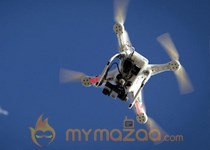So this is what happens if you push the Federal Aviation Administration (FAA) too far on the issue of commercial drone flights.
The agency on Tuesday proposed a colossal $1.9 million fine for Chicago-based drone operator SkyPan for allegedly "endangering the safety of our airspace" during unauthorized flights over New York City and Chicago. The figure is thought to be a record for a civil penalty against a drone operator.
SkyPan has 27 years of experience in the aerial photography business and offers clients "bird's-eye views" using a range of platforms, drones among them.
The FAA claims SkyPan's 65 offending flights took place between March 2012 and December 2014 "in some of our most congested airspace and heavily populated cities, violating airspace regulations and various operating rules," adding, "These operations were illegal and not without risk."
Forty-three of the alleged incursions took place in the highly restricted New York Class B airspace -- usually areas close to busy airports -- without receiving clearance to access it, the FAA said. In addition, the agency says SkyPan's flying machines were operating without the using the necessary equipment, such as a two-way radio, transponder, and altitude-reporting device.
Commenting on the case in a release, the FAA's Michael Huerta said, "Flying unmanned aircraft in violation of the Federal Aviation Regulations is illegal and can be dangerous," adding, "We have the safest airspace in the world, and everyone who uses it must understand and observe our comprehensive set of rules and regulations."
The proposed fine comes as the FAA continues work on drawing up a comprehensive set of rules for the commercial operation of drones. The agency has for some time been accused of dragging its feet on the issue as a growing number of businesses interested in using the technology call for more rapid progress.
A set of proposed rules released earlier this year by the FAA include a speed limit of 100 mph and an altitude limit of 500 feet for commercial drone flights. In addition, it suggests drones will have to be flown within the line of sight of the operator and in daylight hours only.
Further disappointment came last week when the FAA missed a deadline -- set by Congress in 2012 -- to publish a definitive set of guidelines for drone flights. The agency said the rules should be in place by "late next spring."
Until then, the FAA is offering drone permits to a number of companies on a case by case basis. About 1,800 have been granted to date, though each comes with a set of strict rules governing flights.







